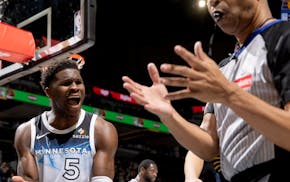The Gophers football team opens its season Thursday night, which inspires what now has become an annual plea to coach P.J. Fleck.
Let 'er rip. Unleash the passing game. Modernize the offense.
Only three teams in major college football attempted fewer passes than the Gophers in the previous three seasons combined. Those were the three service academies (Army, Navy, Air Force) who don't pretend to have much interest in the passing game.
The Gophers have not averaged 200 yards passing in a season since 2019, giving them one of the least productive passing attacks in the nation.
That must change. Fleck knows it. Everyone inside the program knows it. Now, it's about showing it.
It remains perplexing that a coach so forward-thinking in every other facet as a program CEO also can be so old-fashioned when it comes to offense. Fleck at least sounds intent on being more balanced on offense.
The overreliance on the running game was good enough for the Gophers to remain yearly contenders in the plodding Big Ten West. But the conference is deeper and more challenging now, meaning more will be required from the scheme, play-calling and personnel.
This is not a clarion call for anything resembling the Air Raid. Just put more Air into the equation.
Fleck constructed one of college football's most efficient passing offenses in 2019 with Tanner Morgan throwing to future NFL receivers Tyler Johnson and Rashod Bateman. That passing attack had timing, rhythm, design and confidence.
The Gophers didn't pass the ball at an unusually high rate that season, but they were highly effective when they did throw. And not by coincidence, they posted the program's third-highest scoring average (34.1) since 1946.
Since 2019, their passing game has been largely unreliable and untrustworthy, which has caused Fleck to retreat and ride his running backs relentlessly.
The offense desperately needs balance. It needs creativity and a credible passing threat to void being so predictable. Their approach too often feels self-defeating because it requires precision to produce methodical, run-heavy scoring drives over and over. Too many things can interfere with doing that successfully.
Fleck and his coaching staff clearly know how to build a powerful running game. Imagine how their running backs can benefit from a reliable passing game.
Fleck has not been bashful in expressing optimism about transfer quarterback Max Brosmer, who arrives after a decorated career at New Hampshire. His leadership has drawn rave reviews. His debut against North Carolina carries with it a blend of curiosity, hope and high expectations.
The Gophers believe they have the right guy at the right time.
Brosmer replaces Athan Kaliakmanis, whose career in Minnesota didn't go as planned. Kaliakmanis lasted one season as the full-time starter. There is no point in revisiting all that went wrong, except to acknowledge that every facet of the passing game needs to be infinitely better.
Brosmer brings a reputation of being a smart, instinctive, accurate passer. That's a good starting point.
His receivers must do their part, too, and show more dependability. That group had an inordinate number of drops last season.
A combination of the quarterback misfiring open receivers and receivers dropping catchable passes caused Fleck to lose trust in the whole thing. His fallback has been to shut it down and lean even more on the running game.
The passing game is not a light switch. It can't be turned on infrequently and expected to hum like a well-oiled machine without being nurtured and developed.
The expanded Big Ten requires a different approach. The Gophers will have tougher schedules from this point forward. Newcomers Oregon, USC and Washington featured some of the highest-scoring offenses in FBS the past few seasons.
Fleck won't deviate too far from his core philosophies, but being more unpredictable and explosive will raise the ceiling on his program. That is a missing dimension right now. A new era of Big Ten football is beginning. The Gophers offense needs to evolve right along with it.
Scoggins: The area where shots get blocked serves as a proving ground for Wild

Scoggins: Wolves must call on calm when the whistles favor the Lakers

Scoggins: After a sleepy start to the season, Twins are showing signs of life
Scoggins: Williams Arena needs to get a piece of its history back


